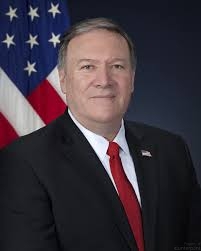What could US Secretary of State Mike Pompeo be doing in the rarely news worthy Pacific isle of Micronesia? What ought to pique the observer’s curiosity further is the fact that Pompeo is the first US Secretary of State to visit the idyllic, Pacific island state, located in climes that have been hitherto comparatively untouched by the harsh realities of big power international politics in post-Cold War times.
Obviously, these ‘untroubled waters’ are seemingly of renewed and increasing interest to the sole super power, although there have been some lingering treaty ties between the sides over the years. The isles are far from being some forgotten backwaters as far as the US is concerned.
What is more, the US seems to be intent on bringing the entirety of these island states in the Pacific within its sphere of influence as never before. Palau and the Marshall islands are two other such isles that are coveted by the US. At the time of writing Pompeo is on tour among these mini states with the hope of renewing and strengthening diplomatic and friendship bonds between them and the US. A senior US State Department official was quoted by AFP as saying of these Pacific isle climes that ‘It’s still a major strategic area; and this isn’t new…Now, the level of interaction is clearly elevated.’
What is driving the US diplomatic offensive in this segment of the Pacific are reportedly Chinese efforts to suck the isles into its orbit of influence by providing them infrastructure loans and other forms of economic assistance. It seems as if even the smallest of states and regions are not immune to the competitive influence-wielding efforts of these major powers whose tussle for global supremacy is increasingly in overdrive mode.
Accordingly, what is so surprising and new in US efforts to upgrade its military and strategic ties with South Asia in general and Sri Lanka in particular? The question derives mounting urgency against the backdrop of the splurge of commentary, locally and internationally, the SOFA and ACSA military cooperation instruments have been provoking over the months in US-Sri Lanka relations. While the intense concern stirred by these instruments among Sri Lankan opinion and policy moulders is

legitimate, the more objective observer is likely to wonder whether there isn’t a considerable amount of ignorance and emotionality in some of the reactions to the accords under discussion.
The impression forces itself on the observer that it is only now, decades into ‘Independence’,that Sri Lankan opinion in particular is coming to grips with some of the gut issues in regional politics. Sri Lanka was always coveted by the big powers as being of tremendous strategic importance.
For example, the strategic port of Trincomalee was sought after, first by Britain and eventually by the US and China. Meanwhile, regional powers, such as Japan and India, have been seeking to be influence wielders over Sri Lanka as well. The instruments sought to be applied for this purpose have varied, but the objective has remained constant; that is, the establishment of enduring influence over this country’s policy-making process. This tussle for a strategic foothold in Sri Lanka is on and would continue into the future, considering Sri Lanka’s multiple vulnerabilities and weaknesses.
However, undoubtedly, at present it is the US that is the most aggressive and assertive in these influence-wielding efforts. A tendency on the part of the US to use the ‘big stick’ or hard power and not so much soft power makes it stand out as the most aggressive international power seeker in this region at present.
That said, it would be futile to premise one’s thinking on these questions on the belief that the US is here to protect Sri Lankan life and limb from terror through instruments, such as, ACSA and SOFA, for example. This is erroneous thinking at its height. The US has been ‘interfering in Sri Lankan affairs’ over the years and would continue to do so for strategic and military reasons in the main.
For this purpose it may use policy instruments that at first blush may seem to be humanistic and ‘charitable’ in kind but which are strategic in final aim. We are forced to repeat the tired cliché, ‘there is no such thing as a free lunch’. If Sri Lanka allows itself to be deluded on these questions, Sri Lanka has only itself to blame for it. Apparently, the Lankan polity needs to constantly educate itself on foreign policy issues.
However, the bald truth is that the US is unprecedentedly aggressive and assertive; particularly in Asia. Its status as the number one military, economic and political power in the world compels it to be so. This is a major power’s essential nature. Under a conservative ultra-Rightist administration, such as the current one under President Donald Trump, such tendencies should be expected to grow several fold.

However, the US is not operating in a power vacuum. Its actions are best understood when studied against the backdrop of the current international power system. It is a preponderant power by itself but it also reacts to perceived challenges and threats in the global power order. China is bent on penetrating the world mainly by economic means and it is steady on this course in our part of the world and outside it, but it is seen by the US as getting in its way.
It could be said that the US and China see the world as their ‘stage’; their competition for control and influence is carried out at multiple levels, but in mainly economic terms in the case of China and in military cum economic terms in the case of the US. As this is being written, for example, the indications are that the US would be stationing intermediate range nuclear weapons in Asia. Needless to say, this measure would have the effect of accelerating the nuke arms race in Asia.
It is the perception on the part of the US that it is losing out to China in this struggle to be dominant that compels it to covet the ‘Indo-Pacific region’. This ambition cannot be divorced from China’s ‘Belt and Road’ initiative which, when realized, will spread China’s economic influence almost world-wide.
Hence, the US’ impatience to get ahead.



 Logging you in...
Logging you in... Loading IntenseDebate Comments...
Loading IntenseDebate Comments...

